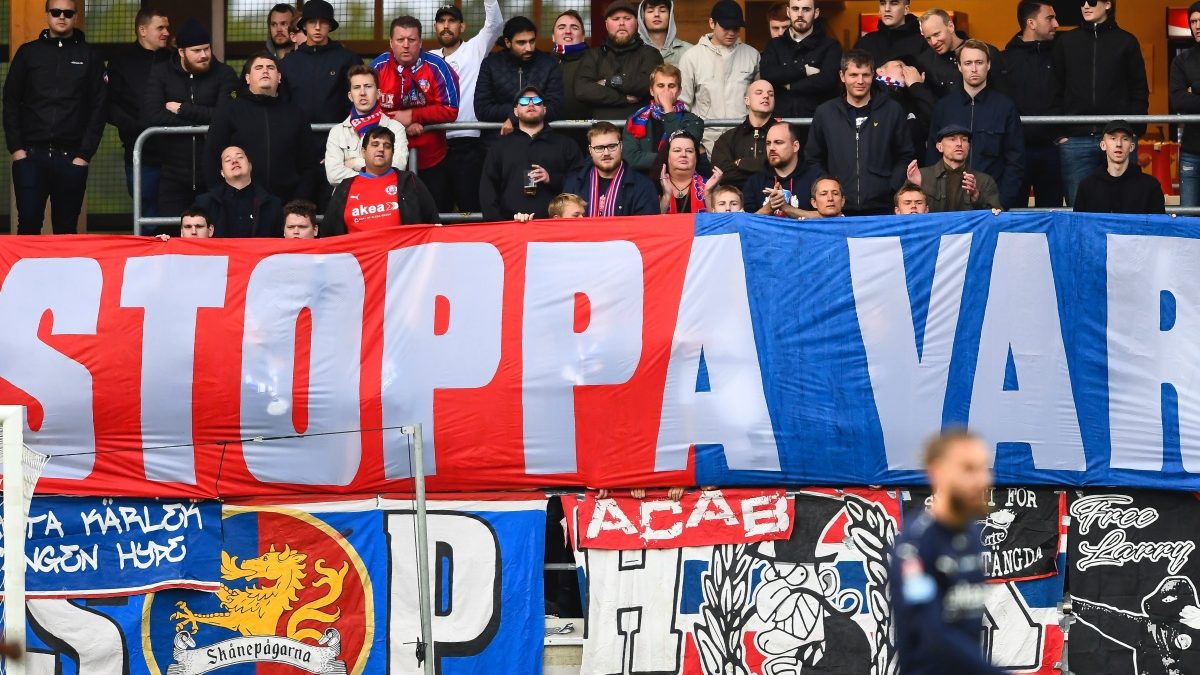

)
Even as other top leagues in European football embrace technology in the form of Video Assistant Referee (VAR), one country has held out. Sweden will not be implementing the VAR system after clubs voiced their opposition to the technology, the football federation’s chairman Fredrik Reinfeldt said.
For all its hype, VAR has consistently been at the centre of controversy in leagues where it has been used, with complaints ranging from extensive analysis of close calls, delays that last several minutes to uneven implementation of rules.
In July 2023, the Swedish Professional Football Leagues, which represents clubs in the country’s top two divisions, said a majority of clubs in the country “actively opposed” VAR.
“If I counted correctly, we have 18 elite clubs and two districts that have said they do not want to introduce VAR,” Reinfeldt told the Aftonbladet newspaper in an interview.
“We respect that. That’s why we didn’t bring forward any proposal about VAR to the previous board of representatives meeting and I don’t foresee it in the future either. I stand by respecting the democratic rules of the game,” he added.
Swedish Football Association’s (SvFF) stance means that the Allsvenskan, Sweden’s top tier, is the only league among UEFA’s top 30 divisions to reject VAR.
Why has Sweden rejected VAR?
“VAR is a symbol of modern, commercialized-to-the-point-of-destruction football,” says Ola Thews, vice-chairman of AIK’s largest supporter organisation, ASK.
Thews has been crucial in mobilising the anti-VAR sentiment among Sweden’s top clubs. They helped push through a motion at AIK opposing the introduction of VAR.
It has been made possible because Swedish clubs are majority-controlled by fans under a regulation that states members should control at least 50% of their club’s shares, plus one.
VAR “ruins the euphoria” that football can bring, believes Thews. “The absolute happiness and passion, or grief and sadness, that comes from a goal being conceded or a goal being scored if you’re not sure what has happened until it has been reviewed and decided in a VAR room.”
On the other side, without VAR, Allsvenskan is seeing mistakes go undetected. Martin Ingvarsson, the head of referees, keeps a log of all the obvious mistakes made by match officials in the top league. Ingvarsson accounts that in each of the last two seasons there were 41 occasions when VAR would have intervened had it been in use.
Thews doesn’t mind. “I think anything where you have actual real-life humans participating is going to be imperfect,” he said. “That’s the beauty of it.”
Bersant Celina, a midfielder for AIK, agrees. “It’s the proper football way. It’s pure,” Celina told the AP. “Referees are also part of the game and they can make mistakes.”
How has VAR been controversial?
In the English Premier League, a communications mix-up between the video official and the on-field referee cost Liverpool a valid goal in a loss at Tottenham in October.
Weeks later, a Tottenham-Chelsea match had a total of 21 minutes of stoppage time added on largely because of a raft of reviews.
Earlier this month,
Nottingham Forest questioned the integrity of a match official
, after being denied what they perceived to be three clear penalty shouts overlooked by the video referee.
In England, as per Sky Sports in February, 82% of refereeing decisions were deemed “correct” by the Premier League before VAR was adopted in the 2019-20 season. Since VAR’s introduction, 96% of the decisions are correct, according to the league.
In Spain, Barcelona threatened legal action and asked for a replay after a
VAR-related controversy
in the recent
Clasico against Real Madrid
. That controversy, however, related more to the absence of goal-line technology than the VAR itself.
Across Sweden’s border in Norway, fans have become increasingly disillusioned with VAR after just one season. In one match, it took seven minutes for VAR to decide on an offside call — FIFA’s original vision said it should take no more than six seconds.
“Throughout the season, after seeing VAR in full effect, opposition has grown a lot and there’s been a lot of disgruntled supporters, football staff and coaches, and players as well,” Anders Kjellevold, chairman of the Norwegian supporters’ alliance, told The Associated Press.
Norwegian supporter groups are now looking to follow Sweden in an attempt to remove VAR from their competitions.
“We try to take inspiration from Sweden — what they did, how they organised themselves to influence the clubs,” he said. “Even though we’re late in the process, we’re actually trying to do something similar.”
(with inputs from AP)